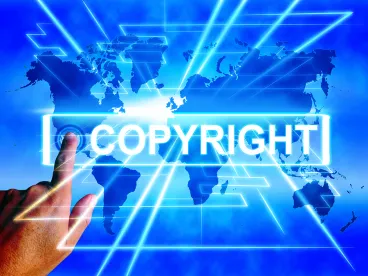Marketing on social media is nothing new, but with the world in various forms of lockdowns, social media has become one of the main forms of communication to the public. Therefore, every marketing professional should think about the intersection of copyright law and social media.
Copyright protects original works of authorship that are fixed in a tangible medium of expression. This broad definition means that copyright can cover numerous types of works such as photos, music, graphic images, videos, computer software and website displays. Also, a registration is not required to have copyright protection. A work is protected by copyright as soon as it’s in a fixed format– meaning anytime a protectable work is posted on social media, it is protected by copyright.
In considering protection, every marketing professional should consider (1) protecting their company’s intellectual property and also (2) protecting their company from intellectual property infringement claims.
Protecting your company’s intellectual property
Although a work might be protected from the moment of creation, a copyright registration is now required if you plan to commence an infringement suit. On March 4, 2019, the Supreme Court issued a unanimous decision in Fourth Estate that an infringement litigation may only proceed when the U.S. Copyright Office officially registers the copyright. A good rule of thumb is if you think that a third party might try and take the work you are posting, then it is best to file a registration with the Copyright Office as soon as practical. The timing of when you file an application can also mean the difference between only obtaining actual damages – which are difficult to prove – versus statutory damages which can be as high as $150,000 for willful infringement along with the payment of your legal and attorneys’ fees.
Protecting your company from intellectual property infringement
With so many works easily accessible with a simple click of copy and paste, it might be tempting to “borrow” from the wide realm of works on the internet. However, marketing teams should think about every work that is being posted on social media. A “pausing before you post” routine can save your company from a cease and desist letter or even litigation. If a work was created by a third party (i.e. not your company), the best protection is to ask and receive written permission from the owner of the work. Another great protection is to create the work in-house! As these options aren’t always viable in our fast-paced world, there may be free-to-use, legal content available. A savvy marketing team can use websites that have written rules regarding free to use works for commercial use such as creativecommons.org or Flickr and your company may even have licenses for other stock services such as Getty Images. Also, remember to download and read the copyright agreement from these websites as they each have slightly different rules. It is also good practice to save the agreement. You can always refer back to that agreement later if your use is questioned.
There are a few misconceptions about just using a work found on the internet and posting it to your company’s social media page:
-
Giving attribution and linking back to the original work protects us from infringement – This is a common mistake. For works protected by copyright, you need permission to use the work, and attribution is not a substitute for permission.
-
The owner clearly meant for anyone to use it, they posted it on social media! – Just because the work is on social media doesn’t mean it loses its protection. It might be easier to copy, but the work is still protected.
-
This work has minimal creativity, and probably not protected by copyright – The creative standard for a piece of work is quite low, so odds are that the author of the work is going to have some protection in that work, even if it might be minimal.
-
If the owner complains, I can just take it down – Great idea to take it down, however, an aggressive copyright owner can still ask for damages for the copying and displaying of their work without permission during the period in which it was displayed.
A general knowledge of copyright law is essential for creating content on social media. With this general knowledge of copyright law, and a simple pause before you post, you and your marketing team can protect your company from infringement and infringing others. In-house counsel are advised to communicate with their company’s marketing department to ensure they are protecting the company’s copyrights and not infringing on others’ intellectual property.




 />i
/>i


